×
SparkFun will be closed on Tuesday, December 24th, and Wednesday, December 25th, in observance of the Christmas holiday. Any orders qualifying for same day shipping placed after 2:00 p.m. (MST) on Monday, December 23rd, will be processed on Thursday, December 26th, when we return to regular business hours. Wishing you a safe and happy holiday from all of us at SparkFun!
Please note - we will not be available for Local Pick up orders from December 24th-December 27th. If you place an order for Local Pick-Up we will have those ready on Monday, December 30th.
Recently I had an idea for a project. I have a deck of Brian Eno's Oblique Strategies cards. Each card has a phrase printed on it that is intended to help the reader break a creative block. You grab a card when you're struggling with creativity, and it encourages lateral thinking. For example:
Image Credit: imporovisedlife.com
My idea was to come up with a way to share these cards with my coworkers, for when they face a creative block. Functionally, this is an easy project: the user presses a button, and receives a phrase. I needed inspiration for an eye-catching enclosure in which to install this device. What if the phrases were dispensed by an antique Zoltar machine? What if you had to play a game to get a phrase? I realized that I was thinking about a problem that is commonplace to me, but may be new to others: once you have a project idea, what do you install it in?
Image Credit: zoltarmachine.com
Many of the projects I see are purely functional. They're installed in the ubiquitous plastic project enclosure, with or without labels on the controls
That works, if the focus of the project is purely function. However, if the form is important, the enclosure of the project can be the difference between a clever project and a piece of art. I get a lot of inspiration by taking the time to find a novel enclosure, so I decided to share some of my favorite enclosure sources and ideas, so that others can find inspiration as well.
Thrift Store
Image Credit: arkinc.org
When I go to a thrift store, I'm always keeping an eye out for anything that might make a good enclosure. Stuffed animals, old stereo equipment, breadboxes, you name it. Anything that has volume can be an enclosure. The thrift store is a goldmine of strange, antique, and unique do-dads that can make cheap and interesting enclosures. Often I'll buy a something to use as an enclosure without even having a project in mind, or I'll be inspired to create something by the potential enclosure itself.
Army Surplus
Image Credit: colemans.com
The military makes lots of containers. So many, that they fill their surplus stores with lots of tough, cheap, and unique potential project boxes. Ammo boxes, water cans, and kit boxes make great enclosures, and because they were designed for abuse, the containers are as close to indestructable as you can get. Whenever I'm building something that needs to be tough, the Army Surplus store is my first stop.
Ikea
Pictured: The "Snika"
Image Credit: ikea.com
Ikea may be known for strangely-named cheap furniture, but they also have a huge selection strangely-named cheap boxes and cases, which are usually made out of material that can be easily modified. If I need a quick enclosure for a product, this is where I look first. Usually Ikea has something that I can use in place of a plastic project enclosure, but with more style and a unique look.
Ebay
This should really go without saying. With some creative searching on ebay, you're guaranteed to find something strange and interesting to use as an enclosure. My usual strategy is to start with what I'm looking for, like "box" or "enclosure" and then add descriptive words to make the search more interesting, like "vintage", "antique", or even "ugly".
The first hit for "ugly enclosure"
Image Credit: ebay.com
Another strategy is to search for things that you can modify to harvest their enclosure. Old geiger counters, anything "coin operated", and vintage machinery all have interesting enclosures that are perfect for modification and have a great style
Image Credit: ebay.com
A good enclosure can make or break a project. It can define how the user interacts with the device. It can make it scary or funny. It can be the difference between a functional device and a piece of artwork. Where do you find enclosures? What's your favorite example of a non-obvious project box?

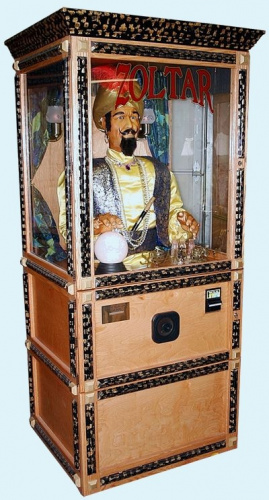

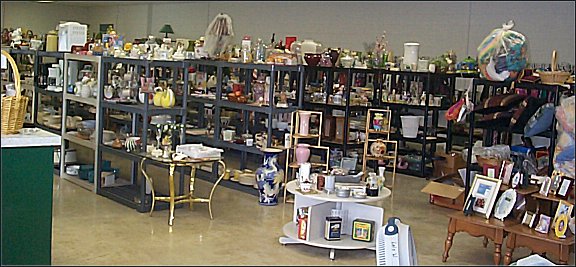
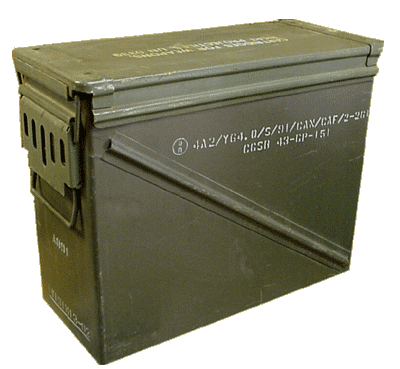
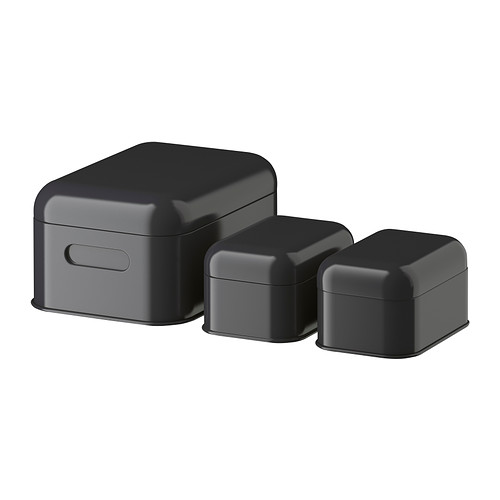

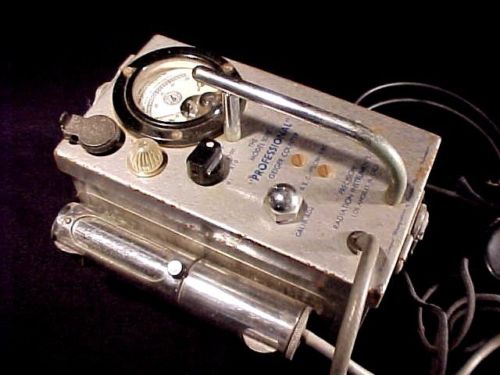






I built a remote video camera timer to record the Antares rocket launch attempt last week that blew up 15 seconds in to launch. I used a tupperware container for the enclosure, with a piece of metal bolted on to allow attaching it to a tripod. I cut out a hole for the lens, and stuffed the electronics inside.
http://imgur.com/a/ion5O
The camera is a Mobius Action Camera. I used half of a waterproof case to protect the camera from the elements. I got a lot of the electronics from sparkfun. The timer is a Teensy 2.0 with a micro SD card and an RTC running on a pair of D cell batteries.
This camera was setup ~600 ft from the launch pad. Despite the explosion and massive fireball the camera may have survived. It is visible in the pictures of the aftermath still standing and pointed in the right direction. I'm hoping to get it back soon, and assuming there is any video captured I will be posting it soon after.
Whoa, that's awesome. It'd be cool to see how well the enclosure stood up to all of that!
The camera and case survived completely unharmed! It actually doesn't look any different than the image set I posted.
Here's the video I captured: https://www.youtube.com/watch?v=_bMuGhgHKXo
Fantastic! Really cool video. Thanks for sharing!
Wooden cigar boxes are pretty legit. I also laser cut boxes a lot; there are box pattern generators widely available online.
Cigarboxnation.com is a great source for cigar boxes, in a wide variety of shapes and prices. My current (not yet completed) project uses one. Cigar boxes are easy to work and relatively cheap.
I like that box pattern generator. Its nice that I don't have to go draw out each one. Clever idea.
Oops.
Makes me think of when my friend asked me if he could use one of my Tupperware containers for an electronics enclosure the night before his senior design expo!
Great tips for sources. I don't have new wisdom on other sources but here are examples from some interactive toys I have built for various makerfaires. The first image
https://www.dropbox.com/s/p6e4boro90brd7n/makerfaire_2013.jpg?dl=0
shows three projects. At left is a "Haiku generator", somewhat steampunkish in inspiration, built into a prop fake antique wooden travel case from ebay. People like the case almost as much as the machine inside. Behind is an "Iron Chef kitchen countdown timer" built into an old PC speaker. I reused the speaker, amp, and on/volume switch that was already in the case. In the foreground is a "draw-a-min" built into a steel utility box from Skycraft Surplus & augmented with PVC tubing.
The project for this year's Orlando Makerfaire was "The Metropolis Device"
https://www.dropbox.com/s/p2btd1nhu9sfw1p/metropolis_outside.jpg?dl=0
I was going for more of a mad scientist's lab from the art deco era. I hope Rotwang would have approved. Most of it was built into a something called a Caulkins Breakfaster that I got from Etsy. A lot of stuff was stuffed in there to drive lots of EL wire, servos, and an aquarium pump:
https://www.dropbox.com/s/z0yddf0yklph7bf/metropolis_inside.jpg?dl=0
You will also see bits from lamp fixtures, closet door frames, heat sinks, antique electrics and I dont remember what all sprouting from that thing. It lights up and bubbles furiously when tinkered with.
I spend at least as much on the enclosures as the internals.
I designed a serial data logger product for acoustic pressure pulsations monitoring. I use the BEX Series 3 model from boxenclosures.com, and have end panels fabricated by frontpanelexpress. These design choices pushed up the project cost higher than my original budget costs, but so far, it's working out all right. The enclosure blocks rf and is very high quality. I'm using a Sparkfun 16x2 white on black serial display for status.
cigar boxes from your local shop... :)
I don't want to start a run on my favorite enclosure source, but with the ability to laser cut beautiful front panels, old instrumentation, as in 1950's to 1980's can be really cool. The newer end of the range has the standard (in the U.S.) three prong power in for a standard power cord. You can gut the rest and mount everything on the new front panel, including LCDs, rotary knobs, touch switches and sliders, etc. and leave loads of room for a modern switch mode power supply and any other larger object. This is best for things you don't want to be so small they will tip over or get stepped on or when you want to be able to stack things or put your coffee cup on top of your instrument. I'll have to do a new example.
When I built my Nixie clock, I searched architectural salvage as well as some of the places you mentioned. There were a ton of great potential enclosures there. I didn't find exactly what I was looking for though and went a different route I'm somewhat surprised you didn't mention: I built it!
The main construction was oak panels from the local hardware store. I wanted a metal grating for the window and had to search far and wide for scrap (talked to metal workers in the area, visited the scrap yard...) and ended up with a vent from a piece of exercise equipment.
It's a whole lot more work this way, but the end result can be perfectly suited and truly unique.
Anyone interested: https://plus.google.com/113825690086131396297/posts/3YxUHktmzoH
That is really slick looking.
That grating is fantastic-looking.
I always look at the old electronics that get tossed at work or at home. For instance, an old computer case can be great for larger enclosures. Often, the only thing I have to do is to replace the front plastic with some custom front panel.
I've seen Tupperware containers used in power plants. Oh and TSA seems to not tear apart your electronics if you house them in clear fishing lure boxes. :D